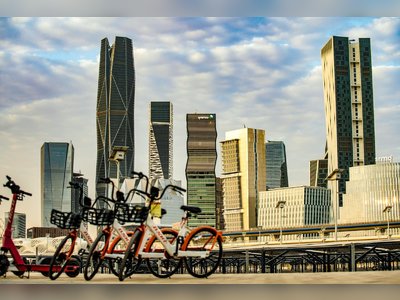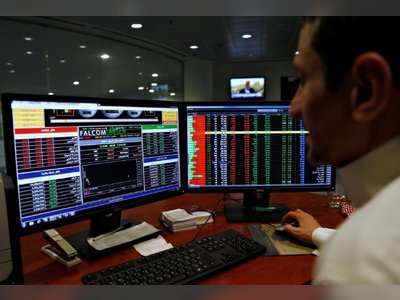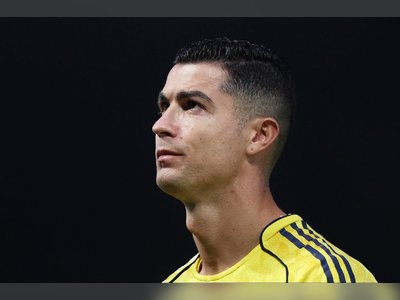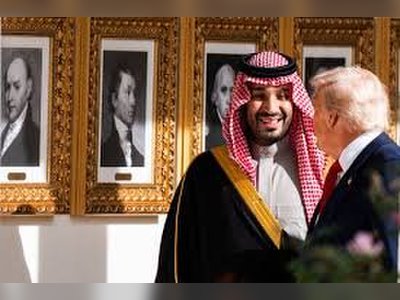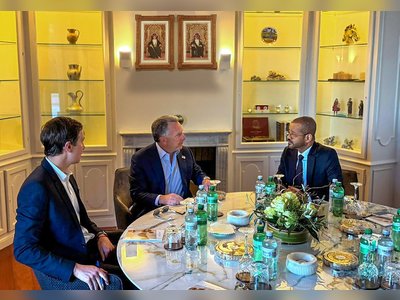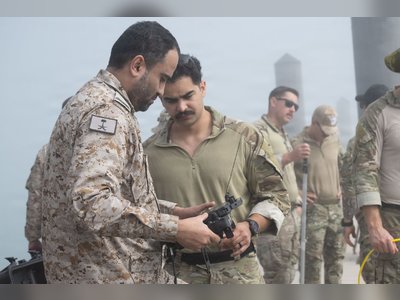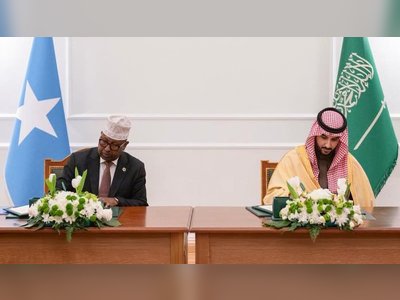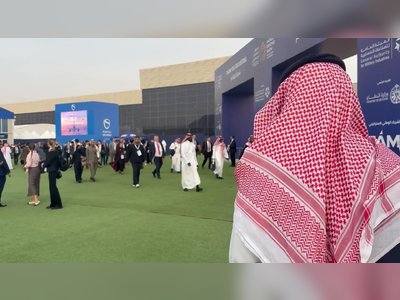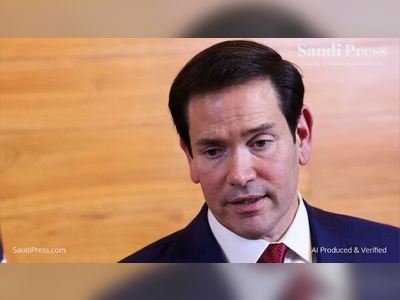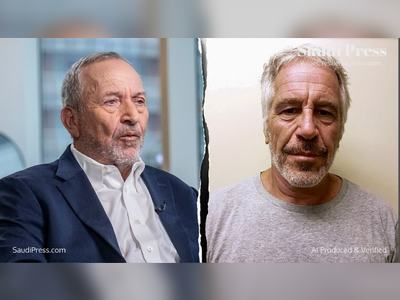
New Gulf year - World - Al-Ahram Weekly
Ahmed Mostafa sums up a year of Gulf political developments
If this year marked the world’s recovery from the coronavirus pandemic, it marked a lot more for the Arabian Gulf countries, where it was the region’s settling-down year. The shock of declining oil prices in the spring of the previous year meant more stringent internal policies with oil prices rising again by almost half this year. A barrel of oil selling for around $55 at the start of the year was fetching $85 by year’s end. Warmer relations with Israel culminated in the Abraham Accords between the Jewish state and both the UAE and Bahrain, becoming more mainstream in 2021. It was also the year that saw a change in leadership in two of the Gulf countries: Kuwait and Oman. This year was meant to be the year to settle the bloody war in Yemen, but it fell short of achieving that goal and instead saw an escalation in fighting.
The most important preamble to the year was the change in the White House, as the Americans elected Democratic candidate Joe Biden to replace Donald Trump in November 2020. This shifted the dynamics in the Gulf region and beyond, so much so that 2021 ended with a Gulf tour by Saudi Crown Prince Mohamed Bin Salman which started with a rare visit to Omani capital Muscat and included the first visit to Doha in almost four years.
The year opened with the resolution of the Qatar crisis that had started in the summer of 2017 when Saudi Arabia, the UAE, Bahrain and Egypt boycotted Qatar for its support of terrorism and militant groups. It ended with Saudi Arabia starting to reclaim its leading position in the Gulf after years of a kind of bipartisan leadership of the Gulf Cooperation Council (GCC). While the three countries boycotting Qatar exerted pressure on the tiny energy-rich state to abandon its support of the Muslim Brotherhood and its terrorist offshoots, Kuwait and Oman tried to mediate and sided with Qatar. Oman and Qatar had a different approach to the Arab Gulf traditional adversary, Iran. As the year progressed Qatar and Oman also maintained good relations with Turkey, another major regional player.
The rift in the GCC started to heal with the reconciliation summit in January that ended the Qatar boycott. It almost took the whole of 2021 to neutralise differences within the Gulf. That paved the way for Bin Salman’s Gulf tour before this year’s GCC summit. The Gulf’s foreign policy during Trump’s years in the White House (2016-2020) has now been reshaped too. The UAE has been leading diplomatic openness to Turkey, Iran and regional hotspots like Syria, Libya and others. That approach moves them closer to the Omani-Kuwaiti stance of low-tension and quiet diplomacy.
It was also a year to continue building a bridge with rising global powers like China, Russia and others. That trend started earlier but established itself in 2021. For example, Saudi Arabia built on its cooperation with Russia in the alliance of OPEC+ to stabilise global oil markets. That led to a better demand-supply balance that pushed prices steadily up.
The Gulf countries are still heavily reliant on energy export revenue. Tens of billions of dollars poured into the coffers of GCC countries. That helped Kuwait, for example, overcome its deficit crisis in the year of the pandemic. It helped Oman adjust its severe constraints on the budget. For Saudi Arabia and the UAE, the flow of oil money helped to finance major changes the two countries are introducing to wean their economies off energy export reliance.
Diversification and sustainability became a Gulf trademark, especially in economic and social policies. Both requires a regional environment of stability and mutual cooperation, rather than tension and aggressive foreign policy. That seems to be the realisation of almost all Gulf countries in 2021. Boycotts within the GCC, animosity with regional powers, excessive foreign ambitions proved to be the wrong choices. Instead of arrogant stubbornness, most Gulf countries changed course in 2021.
Turmoil continues to plague the region, whether in the south – Yemen or the north – the Levant. This is no doubt linked to Iran with ongoing negotiations revive the Iran nuclear deal of 2015. Gulf countries needed to decide on the best way to protect their interests. If they are unable to eliminate Tehran’s influence in the region their best bet is to work on containing it. The same, albeit to a less significant degree, applies to Turkey.
One change is that militants are no longer the imminent threat that the Gulf had feared for years. The Muslim Brotherhood is losing its last bastion in Tunisia, and this reflects badly on all terrorist groups in the region and beyond. Qatar and Turkey are also moving away from strong support for Brotherhood and linked groups.
This isn’t a guarantee of zero problems and challenges. However, 2021 was the start of a shift that set a positive trajectory for the upcoming year. The Gulf enhanced its relations with Iraq this year, after years of indifference or just anger over Iranian influence. Joint projects with Baghdad, including connecting power grids with some Gulf countries, could counterbalance Iranian influence in Iraq.
This year witnessed meetings between Saudi and Iranian officials in Baghdad and Muscat. Though they were low-level meetings with negligible outcomes, they set up an image for the future. The threatening and inflammatory rhetoric between Iran and its Gulf neighbours relaxed in 2021. Yet the Yemen War between the Iran-backed Houthi militia and the Saudi-backed legitimate government did not let up. But there is a realisation now in the Gulf that ending the Yemen conflict is linked to Tehran’s rehabilitation by the big powers.
The latest GCC summit by the end of December might be the launching pad for a “new Gulf”, focusing more on national interests through cooperation. That would apply to economic, social and foreign policy. A new chapter of coherent Gulf policy might bring more stability and security to the region and beyond.
The most important preamble to the year was the change in the White House, as the Americans elected Democratic candidate Joe Biden to replace Donald Trump in November 2020. This shifted the dynamics in the Gulf region and beyond, so much so that 2021 ended with a Gulf tour by Saudi Crown Prince Mohamed Bin Salman which started with a rare visit to Omani capital Muscat and included the first visit to Doha in almost four years.
The year opened with the resolution of the Qatar crisis that had started in the summer of 2017 when Saudi Arabia, the UAE, Bahrain and Egypt boycotted Qatar for its support of terrorism and militant groups. It ended with Saudi Arabia starting to reclaim its leading position in the Gulf after years of a kind of bipartisan leadership of the Gulf Cooperation Council (GCC). While the three countries boycotting Qatar exerted pressure on the tiny energy-rich state to abandon its support of the Muslim Brotherhood and its terrorist offshoots, Kuwait and Oman tried to mediate and sided with Qatar. Oman and Qatar had a different approach to the Arab Gulf traditional adversary, Iran. As the year progressed Qatar and Oman also maintained good relations with Turkey, another major regional player.
The rift in the GCC started to heal with the reconciliation summit in January that ended the Qatar boycott. It almost took the whole of 2021 to neutralise differences within the Gulf. That paved the way for Bin Salman’s Gulf tour before this year’s GCC summit. The Gulf’s foreign policy during Trump’s years in the White House (2016-2020) has now been reshaped too. The UAE has been leading diplomatic openness to Turkey, Iran and regional hotspots like Syria, Libya and others. That approach moves them closer to the Omani-Kuwaiti stance of low-tension and quiet diplomacy.
It was also a year to continue building a bridge with rising global powers like China, Russia and others. That trend started earlier but established itself in 2021. For example, Saudi Arabia built on its cooperation with Russia in the alliance of OPEC+ to stabilise global oil markets. That led to a better demand-supply balance that pushed prices steadily up.
The Gulf countries are still heavily reliant on energy export revenue. Tens of billions of dollars poured into the coffers of GCC countries. That helped Kuwait, for example, overcome its deficit crisis in the year of the pandemic. It helped Oman adjust its severe constraints on the budget. For Saudi Arabia and the UAE, the flow of oil money helped to finance major changes the two countries are introducing to wean their economies off energy export reliance.
Diversification and sustainability became a Gulf trademark, especially in economic and social policies. Both requires a regional environment of stability and mutual cooperation, rather than tension and aggressive foreign policy. That seems to be the realisation of almost all Gulf countries in 2021. Boycotts within the GCC, animosity with regional powers, excessive foreign ambitions proved to be the wrong choices. Instead of arrogant stubbornness, most Gulf countries changed course in 2021.
Turmoil continues to plague the region, whether in the south – Yemen or the north – the Levant. This is no doubt linked to Iran with ongoing negotiations revive the Iran nuclear deal of 2015. Gulf countries needed to decide on the best way to protect their interests. If they are unable to eliminate Tehran’s influence in the region their best bet is to work on containing it. The same, albeit to a less significant degree, applies to Turkey.
One change is that militants are no longer the imminent threat that the Gulf had feared for years. The Muslim Brotherhood is losing its last bastion in Tunisia, and this reflects badly on all terrorist groups in the region and beyond. Qatar and Turkey are also moving away from strong support for Brotherhood and linked groups.
This isn’t a guarantee of zero problems and challenges. However, 2021 was the start of a shift that set a positive trajectory for the upcoming year. The Gulf enhanced its relations with Iraq this year, after years of indifference or just anger over Iranian influence. Joint projects with Baghdad, including connecting power grids with some Gulf countries, could counterbalance Iranian influence in Iraq.
This year witnessed meetings between Saudi and Iranian officials in Baghdad and Muscat. Though they were low-level meetings with negligible outcomes, they set up an image for the future. The threatening and inflammatory rhetoric between Iran and its Gulf neighbours relaxed in 2021. Yet the Yemen War between the Iran-backed Houthi militia and the Saudi-backed legitimate government did not let up. But there is a realisation now in the Gulf that ending the Yemen conflict is linked to Tehran’s rehabilitation by the big powers.
The latest GCC summit by the end of December might be the launching pad for a “new Gulf”, focusing more on national interests through cooperation. That would apply to economic, social and foreign policy. A new chapter of coherent Gulf policy might bring more stability and security to the region and beyond.

